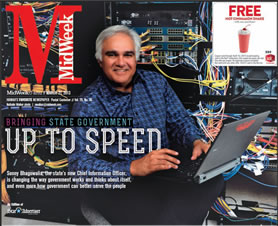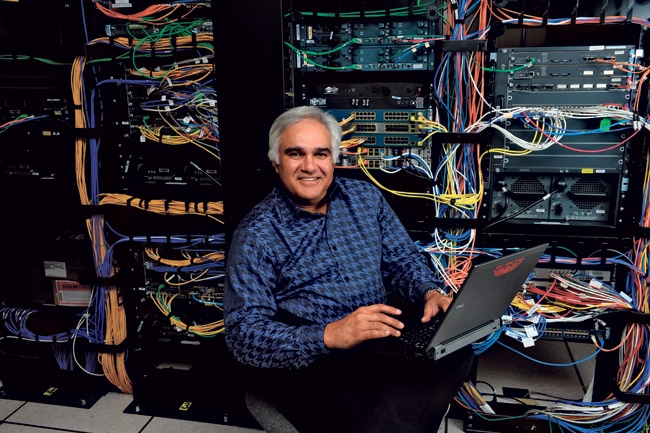Bringing State Government Up to Speed
Sonny Bhagowalia, the state’s new chief information officer, is changing the way government works and how it thinks about itself, and even more, how government can better serve the people of Hawaii
By any measure, Sanjeev “Sonny” Bhagowalia, Hawaii’s first state chief information officer, defies expectations.
cover-1-sonny-bhagovalia
First, one expects a mousy computer nerd to head up what is ostensibly the state’s IT department. Instead, one finds an ebullient man whose voice booms down the hall as you approach his office, and whose infectious smile has any room he is in giggling along with him as he gleefully explains dashboards and hackathons.
Once inside his office, one pictures a bank of mainframes with the only light coming from that emanating from the video screens surrounding him.
Instead, it is open windows looking out at St. Andrew’s Cathedral (“I look out there and confess my sins every day!” says Bhagowalia), and the only computer is a simple MacBook Pro that one would expect to find sitting on a college freshman’s dorm room bed.
But he is a Washington insider, recently working for the Obama administration. There is no way he can understand how we do things out here.
Yet his speech is riddled with Hawaiian-language phrases, and his rallying cry is “aloha with urgency.”
Well, if he does fit in here, then there is no way he is going to get anything done. He must just be another career government worker happy to wile away the days until he gets that swollen pension.
Well, there one would be the most wrong. Upon taking the job, he said he would put together a plan to fix our decades-out-of-date computer system in two years.
He got it done in one. His plan has been so revolutionary that it earned him recognition as part of the 2013 Federal 100 Awards by Federal Computer Weekly. He was the only recipient at the state level to be so honored.
Bhagowalia understands that public servants are there to (gasp!) serve the public. He talks of the 220 business functions they provide as a state government and how unwieldy they were when he arrived.
“One hundred and fifty of those services are resident or citizen-facing, but less than 5 percent are online, so everyone instead has to wait in line – long lines,” says Bhagowalia, who does not blame his predecessor, namely the state comptroller, who Bhagowalia says had plenty to deal with besides the computer issues.
“Every time they go through a process, someone asks them if they brought this piece of paper, and they say, ‘Oh, no!’ and you go to the back of the line. That is what the problem is: What if we had all of that on a website and there is only one way to do it? When you can do one, two and three, and then you are done, it is easier to deal with the government in that way.”
His is an uphill battle. The computers, the programs and the interfacing are antiquated, some dating back to the 1980s because of a lack of attention and funds provided by the state.
“We as a state only spent 1 cent on the dollar for technology for the past 30 years,” says Bhagowalia, who received his M.S. from Syracuse University. “We should have been spending 3 to 5 cents on the dollar. So guess what? Our technology is behind the times. I am just asking for one more cent on the dollar – that is still well below what we need, but with that we can really start to improve it.”
His plan outlines how he doesn’t want to drag us into the modern age, but to leapfrog over all that lost time to make us a leader in technology. He points to Singapore and South Korea as places that were adrift but have now turbocharged their economy through modernizing and helping businesses acquire what they need.
“Everything we do in our lives these days in business requires technologies, but it is more than technology, it is about information,” says Bhagowalia, who began his career in the private sector serving as a senior principal engineer with Boeing. “They need information, they need it to be mobile and to have it at their fingertips right now. You have heard of news you can use; we believe in information you can use.”
He has six mobile apps he will unveil in June, giving the public access to information that previously was available only by visiting the varied offices. Soon, tax information, education updates and even the population in our homeless shelters will be accessible instantly on one’s mobile device.
The first example of how this information can be used can be seen in a project done recently by some of Bhagowalia’s interns from HPU. Simply using the information now available on the Hawaii.gov website, they put together a database where one can track fuel prices, revenue from tourist expenditures and money collected from the cigarette tax.







